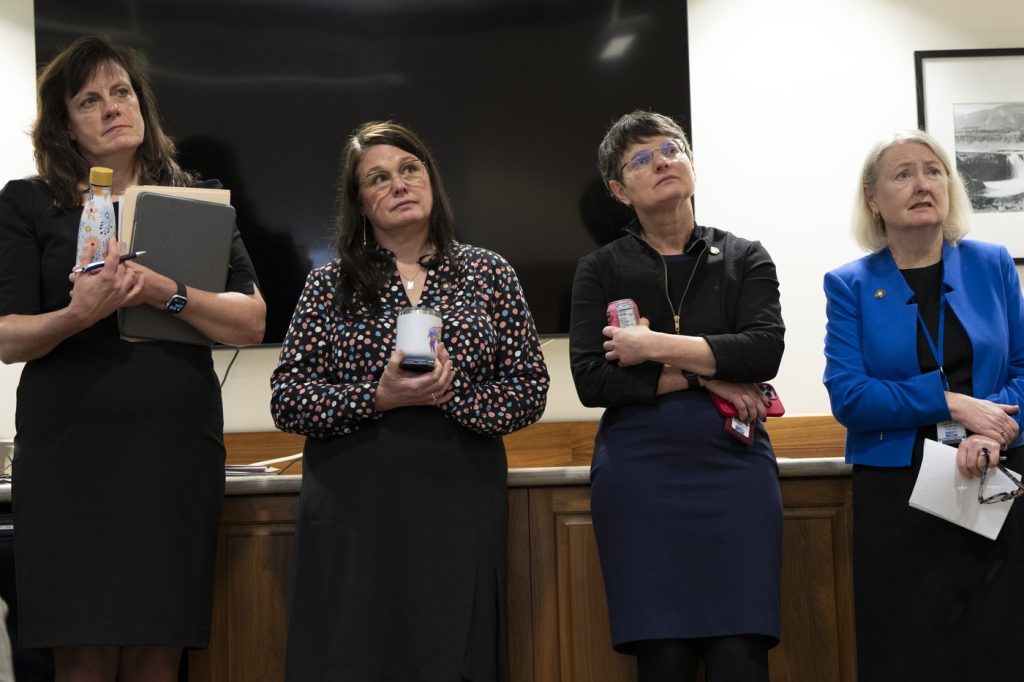The #MeToo movement gained significant attention in 2017, leading to the removal of numerous politicians and prominent figures due to allegations of sexual harassment and misconduct, some dating back many years. In response to this societal shift, various state legislatures across the United States adopted or strengthened their policies regarding sexual misconduct.
Since then, the representation of women in U.S. statehouses has reached an all-time high. As more women assume roles in legislative positions and leadership, opinions diverge on whether the political atmosphere has genuinely changed. Nevertheless, reports of harassment continue to emerge at both the state level and beyond.
The Associated Press conducted a comprehensive investigation, tallying allegations against state lawmakers throughout the country, reviewing the sexual harassment policies in all 50 states, and interviewing lawmakers, lobbyists, and staff members.
Key findings from this investigation revealed that since the start of the #MeToo movement in 2017, at least 147 state lawmakers across 44 states have been accused of sexual harassment or misconduct. Most incidents were reported in the first two years following the movement's onset, but new allegations have surfaced each year since. Notably, in 2024 alone, the AP identified at least 14 state lawmakers from 12 states with accusations—approximately double the number from the previous year.
The survey further highlighted that one-third of the accused lawmakers resigned or were expelled from their positions, while another third faced consequences such as the loss of party or committee roles. Additionally, a dozen top state officials, including governors and attorneys general, have also faced similar allegations during this period, with most opting to resign.
According to the National Women’s Defense League, which advocates for policies against sexual harassment in state legislatures, allegations are nearly evenly distributed between Republicans and Democrats, although 94% of the accused are men.
Despite these changes, transparency remains an issue, as approximately half of all legislative chambers reported having updated their sexual harassment policies within the last five years, yet a significant portion of these policies are not easily accessible to the public. Initially, a survey revealed that about one-third of legislative chambers did not mandate sexual harassment training for lawmakers. Today, most state legislatures offer training, but it is often voluntary, with considerable variation in the content, format, and frequency of the training sessions. Only about a third of chambers provide annual training.
Some legislative chambers, such as the Arkansas Senate, notably lack specific sexual harassment policies, while others, including the Oklahoma Senate, the Mississippi Senate, and both chambers of the West Virginia Legislature, failed to disclose their policies to the AP.
Opinions among lawmakers regarding the changes in the legislative environment remain divided. Michigan state Senator Mallory McMorrow, who filed a sexual harassment complaint against a colleague in 2020, attributes improvements more to the increase of women in leadership than to policy changes or formal initiatives. In contrast, some female legislators still report experiencing sexism in their workplaces. For instance, Georgia state Representative Shea Roberts expressed that the prevailing attitude still pressures women to conform and avoid being disruptive.
Despite the increase in women's representation, which is still below 50%, many advocates believe that the environment within statehouses can be sufficiently hostile to deter women from pursuing political office. Minnesota Senator Erin Maye Quade pointed out that encounters for male candidates often center around job performance, while for female candidates, the scrutiny involves a plethora of additional factors.
Ultimately, men continue to represent two-thirds of all state lawmakers in the U.S. Even as some acknowledge the transformative impact that the #MeToo movement has had in fostering discussions about harassment, a lingering blame toward women persists among some male lawmakers. Kansas Republican Representative Mark Schreiber noted a shift from an outdated "boys will be boys" mentality towards a greater acknowledgment of harassment, emphasizing that men are recognizing that the "wrong people" have often been blamed.










